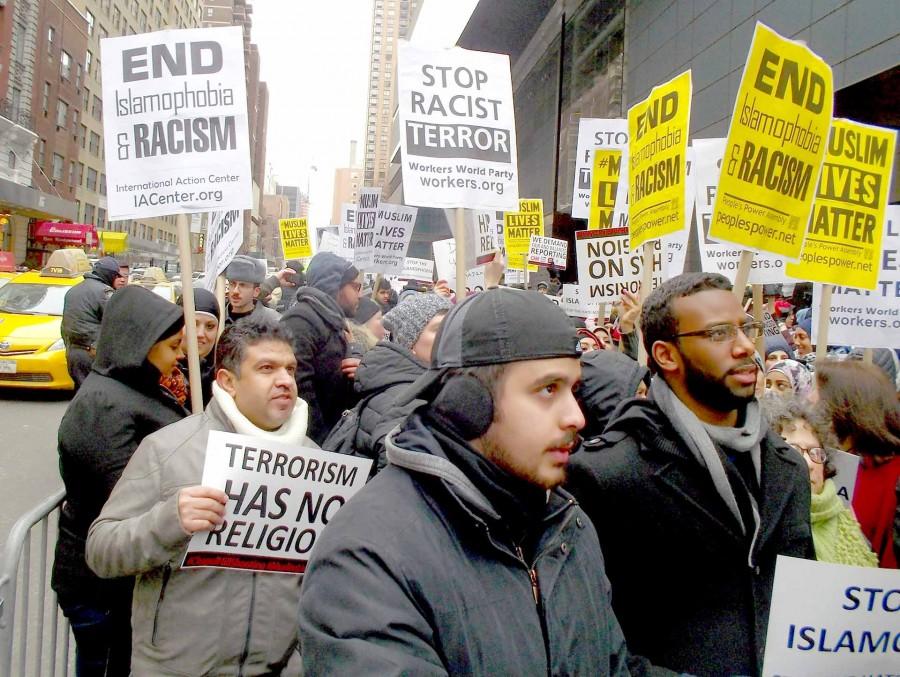Refusing refuge
Prejudice at play in our debate over Syrian citizens
There are a numerous sides to every argument. There are many different takes on one subject, especially when that subject is politically based. We may believe one idea simply because of the political party we support, or because it personally affects us. Yet in the case of the debate over Syrian refugees coming to the U.S., another factor is playing a significant role in deciding our country’s next move: prejudice.
Islamophobia has been on the rise for over a decade, with the initial spike occurring just after the attacks on 9/11. Ignorant hate crimes against Muslims, justified as “fighting terrorism,” became commonplace. As a result, many Muslims living in the U.S., and even in other parts of the world, have felt the need to abandon their cultural practices or move in order to stay safe from the aggression of others. Now, with the country debating whether to allow Syrian citizens to take refuge in the U.S., islamophobia is once again playing a pivotal yet deadly role in our decision-making.
On one side of the argument, there are those who truly want to help. No one likes the idea of leaving an entire people for dead, and if we have the means to help, they believe we should. That’s easy in theory, but in practice would take extensive planning. Aside from finding the means to house refugees, there is the obvious need to background check every individual person.
On the other hand, there are those who don’t want anything to do with helping the refugees. Be it the desire to help our own citizens more, the possible economic or social repercussions or the fear of terrorists among Syrians, they want to keep refugees out of America and in the hands of somebody else. This is where Islamophobia begins to rear its ugly head.
It’s hard to believe that if refugees from France, England or Australia needed to come to America, this much debate would surround their impending acceptance. Would some people be opposed? Absolutely. But would anyone be relentlessly pushing the idea that those refugees would include terrorists? Probably not. That is, plain and simple, Islamophobia.
Before you ask the obvious question: the answer is yes, understandably, people are fearful that some Muslim extremists will be let into the United States. Yes, that is a very real risk involved with taking in Syrian refugees. However, risk is a factor in every aspect of life. We risk a car accident every time we drive home. We risk slipping in the bathtub every time we take a shower. That’s life: weighing the worth of the risks we take.
It isn’t valid to argue that Syrian refugees shouldn’t come to America because of the risk of them being terrorists. That’s discriminating against an entire people based on the actions of very few of them. That’s prejudice. And in this case, deciding against letting refugees come to America is the decision between life and death for them. Isn’t the U.S. dealing with enough “death by prejudice” already?
We don’t have all the answers. Even with thorough background checks, there is still a risk in letting Syrian refugees into our country, the same risks that would exist if we were letting in refugees from any country. There are still the issues of cost, and housing and every other factor involved in the process. But we do know that the culture or religion of the refugees is not the problem, and it ought to remain out of the equation.







Larry A. Singleton • Dec 10, 2015 at 5:06 pm
You gotta be kidding me? I wish I could invite these useful idiots, these “educated” students, over to this dumb-ass construction worker’s house. I’ve studied this issue for almost four years and have the filing cabinets stuffed with article, essays and reports and bookshelves on the subject that go almost from floor to ceiling to prove it.
Any time I see this “Islamophobia” I know to dismiss anything this “Editorial Board” has to say on the subject of Muslims and Islam:
Booklets
Islamophobia: Thought Crime of the Totalitarian Future” by David Horowitz and Robert Spencer.
Muslim Brotherhood in America by Robert Spencer
Subversive Mosques: Why Barack Obama Won’t Declare War on Radical Islam by Pamella Geller and Robert Spencer.
We’ve gone from the Greatest Generation. The Florida Democratic Party “Conducts Outrreach Through Leader of Terrorist Group: Debbie Wasserman Schultz and Company’s Disturbing Embrace of Radical Islam” by Joe Kaufman 12-7-15
My letter to their Facebook page, which will probably be censored, like this one, was “Are You Out of Your Frigging Minds?!?!”
As a country we have totally lost our way. We have given a complete pass to an ideology that were soul mates with the Nazis and participated in the Holocaust. Like then we have given a complete pass to Muslims who have been our historic enemy and whose plans for the Jews is nothing less than their total extermination “from the river to the sea”.